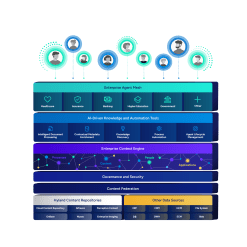Building resilience and agility for manufacturers
Explore what factors make an organization in the manufacturing sector resilient and agile.

Harness the power of a unified content, process and application intelligence platform to unlock the value of enterprise content.
Learn more
Automate your document-centric processes with AI-powered document capture, separation, classification, extraction and enrichment.
Learn about Hyland IDPIt's your unique digital evolution … but you don't have to face it alone. We understand the landscape of your industry and the unique needs of the people you serve.
 Overview of industries
Overview of industries
Countless teams and departments have transformed the way they work in accounting, HR, legal and more with Hyland solutions.
 Overview of departments
Overview of departments
We are committed to helping you maximize your technology investment so you can best serve your customers.
 Overview of services
Overview of services

Discover why Hyland is trusted by thousands of organizations worldwide.
Hear from our customers
Our exclusive partner programs combine our strengths with yours to create better experiences through content services.
Overview of partners
Join The Shift newsletter for the latest strategies and expert tips from industry leaders. Discover actionable steps to stay innovative.
Register now
Hyland connects your content and systems so you can forge stronger connections with the people who matter most.
Learn about HylandWith our modern, open and cloud-native platforms, you can build strong connections and keep evolving.
 Dig deeper
Dig deeper
January 17, 2024
Reading time minutes
Explore what factors make an organization in the manufacturing sector resilient and agile.

Hyland's team

Manufacturing is an industry that truly spans the globe. And in this industry, resilience and agility are of paramount importance. In an age of change and disruption, the ability to react quickly to unexpected developments and bounce back from challenges can distinguish a company from its competitors — not to mention give them the capability to hold down the bottom line in the face of stressors.
There’s no need to enumerate the challenges that manufacturers face, from blockages in the global supply chain to worker shortages and operational issues. Through it all, manufacturing remains a crucial component of global commerce, and innovators continue to improve on the successes of the past.
Now, leaders in this industry must continue to develop attributes that will enable them to remain resilient and agile in an uncertain age. For Hyland’s 2023 report, “Unlocking Business Resilience and Agility,” we analyzed where various industries stand in terms of resilience and agility and what attributes play a role in achieving that position. We’ve identified where manufacturers are strong and where they could do more to leverage their capabilities.
Compared to other industries, the self-perception of manufacturing companies’ capacity for resilience and agility is slightly above average. Fifty percent of executives and employees considered their businesses to be strong or very strong in terms of resilience and agility, while only 28% considered themselves to be weak or very weak.
Certain factors that distinguish the manufacturing industry could play a role in this. Manufacturers are inherently driven by the needs of their customers — so they naturally need to be prepared for changes. Additionally, the manufacturing industry has a history as a fertile ground for innovation.
Manufacturers should find this encouraging. More than anything else, though, it should be a motivator. If 50% of companies in manufacturing are strongly resilient and agile, that means that the other 50% of companies need to put all the resources at their command into developing resilience and agility. Without this, they find themselves at a competitive disadvantage beside their more resilient, agile peers.
This raises the question: What factors make a manufacturer resilient and agile?
Our analysis showed 10 attributes that are particularly important for manufacturing.
We found that most of these attributes were well-leveraged, but there were some notable exceptions. Manufacturing companies have not done the most they can to leverage documented risk tolerance, voice-of-employee processes, governance or effective change management practices.
Risk tolerance is of particular importance in manufacturing, owing to the hazards to which employees find themselves exposed on the job. Workplace injuries are extremely common in manufacturing, and in addition to the pain and suffering experienced by the employee, they can have an impact on the productivity of the facility. Documenting how employees can safely conduct themselves on the job is one key area of focus for manufacturers.
More generally, a greater understanding of the human element —understanding the needs and concerns of their employees — can greatly benefit manufacturers. While they deal in material goods and not services, their workers remain an important part of their transition to a more resilient and agile stance.
As an industry on which other industries depend, manufacturing acts as a keystone, in much the same way as transportation and logistics. Resilience and agility are essential for the bottom line within the industry and for the sake of other connected industries. The analysis shows that many companies in manufacturing have already taken steps to make themselves resilient and agile, continuing a long and proud tradition of innovation.

Explore how executives can overcome a lack of resilience and agility by leveraging three key questions.

Discover why technology alone is not the answer to building business resilience and agility.

Learn more about the three key areas where businesses must find a balance between compliance and employee autonomy, paving the way for enhanced resilience and agility.

Discover four tactics for resilient growth and operational agility in the aftermath of a crisis.